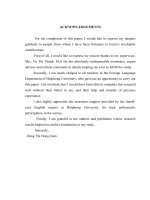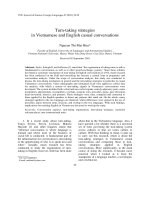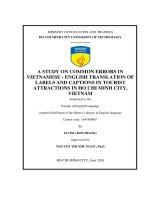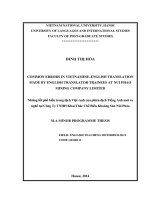STRATEGIES IN VIETNAMESE ENGLISH TRANSLATION official 3 (1)
Bạn đang xem bản rút gọn của tài liệu. Xem và tải ngay bản đầy đủ của tài liệu tại đây (270.23 KB, 33 trang )
STRATEGIES IN
VIETNAMESE – ENGLISH
TRANSLATION
1.Trần Thị Mỹ Hào
2.Lý Ngọc Huyền
3.Trần Hoàng Thanh Nhàn
4.Nguyễn Bạch Tuyết Ngân
5.Lê Thị Diệu Hiền
CONTENT:
TRANSLATION A WORD
WITH
I
OMISSION
•
•
Definition
DIFFERENT MEANINGS
•
•
Examples
II
IV
Examples
Definition
CHANGES OF PARTS
AMPLIFICATION
•
•
•
III
Definition
Purpose
Examples
.
OF SPEECH
•
•
•
•
Change a verb into a noun
Change a verb into a preposition
Change a verb into adjective
Change a noun into a verb
I. OMISSION:
What is omission?
I. OMISSION
Deletion of a lexical item due to grammatical or semantic
patterns of the receptor language.
Help avoiding lengthy and inaccurate sentences.
In Vietnamese language, there are many supporting words
which don’t have clear meanings but mention categories in
certain expressions.
I. OMISSION
While so many abstract nouns are used independently in
English, they generally appear in combination with the
mentioned words in Vietnamese sentences.
Base on the context to have specific meanings or not to
translate or omit.
I. OMISSION
Example 1:
Việt Nam đang đối mặt với vấn đề ô nhiễm môi trường.
Viet Nam is facing environmental pollution.
Example 2:
Nạn đói nghèo đã xảy ra trên toàn thế giới.
Poverty happened over the world.
I. OMISSION
Example 3:
Hương Giang speech: “Tôi sẽ đòi quyền bình đẳng cho tất cả mọi
người vì ai cũng mong muốn mình có cuộc sống tốt hơn, và
người chuyển giới cũng vậy, người chuyển giới mong muốn mình
được hạnh phúc và không bị kì thị…”
Translation version: “ Everyone in the world want to be happy
and transgender want to be happy also…”
I. OMISSION
Exercise: Translate from Vietnamese into English
1. Cục diện kinh tế ở Việt Nam đang có nhiều đổi mới.
The economy of Viet Nam is changing.
2. Nhà trường hỗ trợ sinh viên vấn đề ăn ở đi lại.
The school supports students travel and accommodation .
I. OMISSION
3. Thành phố Hồ Chí Minh đang tìm cách giải quyết vấn
đề tệ nạn xã hội.
Ho Chi Minh city is trying to solve social evils.
4. Hiện tượng sương mù xuất hiện ở phía Bắc của Việt
Nam.
The frog appears in the North of Viet Nam.
II. AMPLIFICATION
1. Definition
Other words: Expansion,
extension, diffusion
Expressing information which is not
present in the SL text may be added to the
TL text
Information added to the translation:
cultural, technical, or linguistic
The additional information: put
in the text or out of the text.
Putting in brackets
Using a footnote
II. AMPLIFICATION
2. Purpose
Convey the exact meaning of the original message in the
process of translation
Example:
Huong Giang speech “Tôi nghĩ giá trị…. cố gắng học tập, cố
gắng lao động để hôm nay tôi có mặt ở đây và trở thành niềm
tự hào cho Việt Nam.”
Translation version “My self – esteemed is…fighting with
myself and I want to support to the LGBT community, work
hard and stay hard for everyone grow up LGBT community.
II. AMPLIFICATION
3. Two cases of amplification
Case
01
Clarifying the
hidden
meaning of a
sentence
Case
02
Example
Mẹ sẽ làm tất cả để cho con có một
cuộc sống hạnh phúc.
Translated version:
“I will do everything to bring you a
happy life.” (Mother talk to her child)
Restoring omitted parts of
the source text to produce
a completely meaningful Example
translated version
Bạn có muốn dùng trà không?
Translated version:
Would you like to drink a cup of
tea?
4. Exercise: Delete some unnecessary
words and put them into correct orders.
a. Đừng quên đánh răng trước khi đi ngủ nhé!
Forget/brush/to/the/teeth/tooth/your/before/bed/going/to/don’t.
Don’t forget to brush your teeth before going to bed.
b. Chúng tôi đang dọn vệ sinh, xin lỗi vì đã gây bất tiện.
Cleaning/we/up/cause/sorry/for/are/inconvenience/any.
We are cleaning up, sorry for any inconvenience.
c. Cô giáo trường Vạn Thạnh đã cứu 2 em bé thoát khỏi đám cháy
trong lớp học.
From/the/saved/students/children/2/out/fire/classroom/teacher/Va
n Thanh/school’s/in/the/primary.
Van Thanh primary school’s teacher saved 2 students from the fire
in the classroom.
d. Tôi tặng đôi giày này cho cô ấy, nhưng cô ấy không dùng mà đem
cho người khác.
This/shoes/gave/and/but/didn’t/of/use/give/it/for/them/her/she/I/
person/another.
I gave her this pair of shoes but she didn’t use and give it for
III. CHANGES OF PARTS
OF SPEECH
Verb ► Noun
Verb ► Adjective
Verb ► Preposition
Noun ► Verb
III.CHANGES OF PARTS OF SPEECH
Change a VERB into a NOUN
Examples:
_Trong buổi họp tổng kết, các chuyên gia đã tiếp chuyện một
cách thân mật và sôi nổi với các đại diện của chính phủ.
At the summing-up conference, the experts had friendly and
enthusiastic talks with government and representatives.
The verb “ tiếp chuyện” was replaced by the noun “talks”.
III.CHANGES OF PARTS OF SPEECH
Change a VERB into a NOUN
Examples:
_Ôi, không bao giờ tôi có thể yêu anh ấy được nữa; vì lòng
chung thủy đã không còn….
Oh dear, never more could my love turn to him; for faith
has been blighted.
The noun “love” was coverted into the verb “yêu” by
using the replacement technique.
III.CHANGES PART OF SPEECH
Exercises: Translate the sentence into English
(change a verb into a noun)
_Chúng tôi tin rằng nền kinh tế Việt Nam sẽ được xếp vào 10
nước đứng hàng đầu thế giới.
Our belief is that Vietnam’s economy will be at the top-ten of
the world.
The verb “tin” was replaced with the noun “belief” to match
the suitable meaning in the target language.
III.CHANGES PART OF SPEECH
Exercises: Translate the sentence into English
(change a verb into a noun).
_ Người ta dự báo thời tiết trong hai ngày tới sẽ rất tệ.
There is a prediction that the weather will be bad in the
next two days.
The verb “dự báo” was replaced by the noun “prediction”.
III.CHANGES PART OF SPEECH
Change a VERB into a PREPOSITION
Examples:
_Con đem cái cuốc ra đây cho ba.
(Child) bring the hoe out here for me (dad).
The verb “cho” in Vietnamese was translated as a
preposition “for” in English.
III.CHANGES PART OF SPEECH
Change a VERB into a PREPOSITION
Example:
_ Theo những gì tôi đã nghe
According to what I heard.
The verb “theo” was replaced with the preposition
“according to”.
III.CHANGES PART OF SPEECH
Exercises: Translate the sentence into English
(change a verb into a preposition).
_ Anh đóng cửa lại cho tôi nhé.
Would you close the door for me?
The verb “ cho” was replaced by the preposition “for”.
III.CHANGES PART OF SPEECH
Change a VERB into an ADJECTIVE
Examples:
a. Tôi sợ rằng buổi họp ngày mai tôi sẽ không tham gia được.
I’m afraid that I couldn’t attend the meeting tomorrow.
The verb “sợ” was replaced by the adjective “afraid”.
b. Anh có biết bây giờ là mấy giờ rồi không?
Are you aware of time?
The verb “biết” was replaced by the adjective “aware”.
III.CHANGES PART OF SPEECH
Change a NOUN into an VERB
Examples:
a. Việc ra ngoài vào thời tiết lạnh như thế này thực sự rất tệ.
It’s too bad to go out in such cold weather.
The noun “việc ra ngoài” was replaced by the verb “go out”.
b. Kì vọng của bố mẹ đã đặt quá nhiều vào cậu.
His parents expected too much of him.
The noun “kì vọng” was replaced by the verb “expected”.









